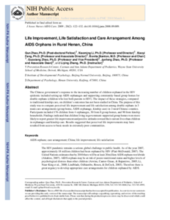The Chinese government’s response to the increasing number of children orphaned in the HIV epidemic included setting up AIDS orphanages and supporting community-based group homes for double orphans (children who lost both parents to HIV). The impact of these strategies, compared to traditional kinship care, on children’s outcomes has not been studied in China. The purpose of this study was to compare perceived life improvement and life satisfaction among double orphans in 3 main care arrangements (group home, AIDS orphanage, kinship care) in 2 rural Chinese counties. Participants included 176 children from 4 orphanages, 30 from 8 group homes, and 90 from kinship households. Findings indicated that children living in government-supported group homes were more likely to report greater life improvement and positive attitudes toward their current lives than children in orphanages and kinship care. Results suggested that perceived life improvements may have resulted from access to basic needs in extremely poor communities.
J Assoc Nurses AIDS Care. 2009 ; 20(2): 122–132. doi:10.1016/j.jana.2008.09.009.

